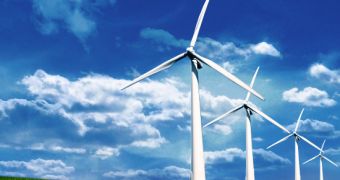This past December really was the season to be jolly, at least as far as wind energy generation in the United Kingdom is concerned. Long story short, the country is said to have broken several records in terms of harvesting wind power.
Information shared with the public says that, in December 2013, wind farms up and running in the United Kingdom had an overall energy output of 2,841,080 megawatt hours.
This electricity was fed into the National Grid, and sufficed to power over 5.7 million households in the country. Otherwise put, it met 10% of the total energy demand of homes, businesses, and factories in Britain, Click Green tells us.
The same source details that, in the week starting December 16, wind farms in the country rolled out 783,886 megawatt hours of electricity.
This power output was enough to meet 13% of Britain's overall energy demand within said time frame, and was the highest to have ever been documented in the country over the course of one week.
What's more, it appears that, on December 21, wind power provided 17% of the nation's energy needs. Thus, on this date, wind farms installed across the United Kingdom produced an impressive 132,812 megawatt hours.
The wind energy produced on December 21 was the highest daily electricity output to have until now been documented in the United Kingdom.
Commenting on these record-breaking figures, Maf Smith with RenewableUK said that, “This gives us a great sense of confidence for the year ahead, when we will continue to increase the amount of clean power we generate from wind, onshore and offshore.”
“This is a towering achievement for the British wind energy industry. It provides cast-iron proof that the direction of travel away from dirty fossil fuels to clean renewable sources is unstoppable,” he added.
Maf Smith further explained that investments in harvesting green energy sources were of utmost importance if the United Kingdom was to reduce fossil fuels imports, cut down on electricity costs, and improve on its ecological footprint.

 14 DAY TRIAL //
14 DAY TRIAL //